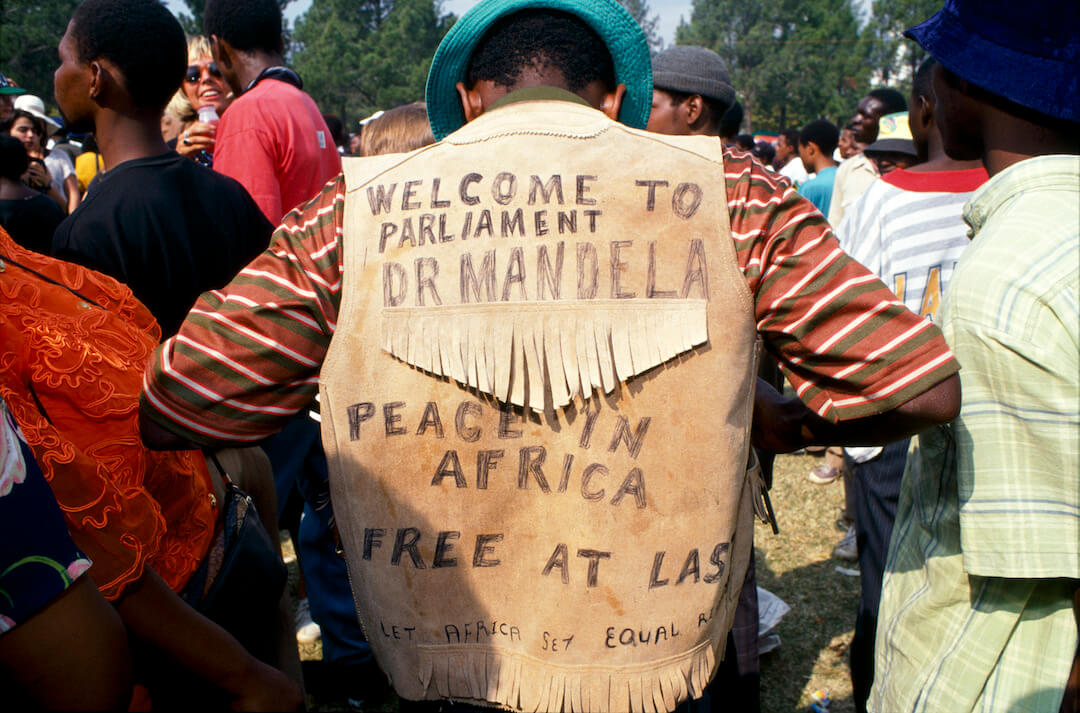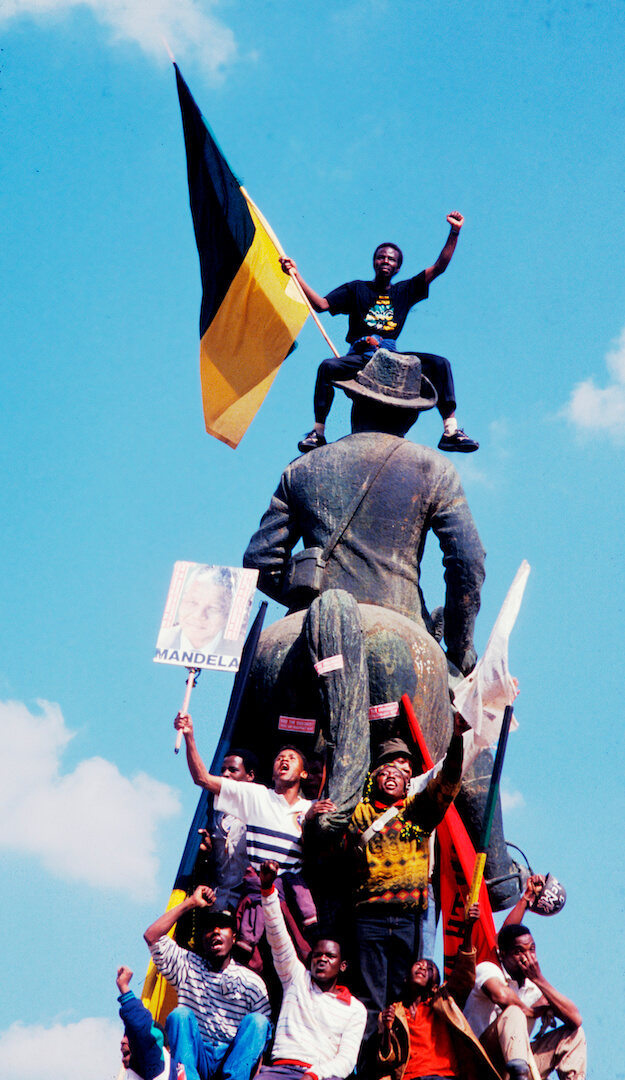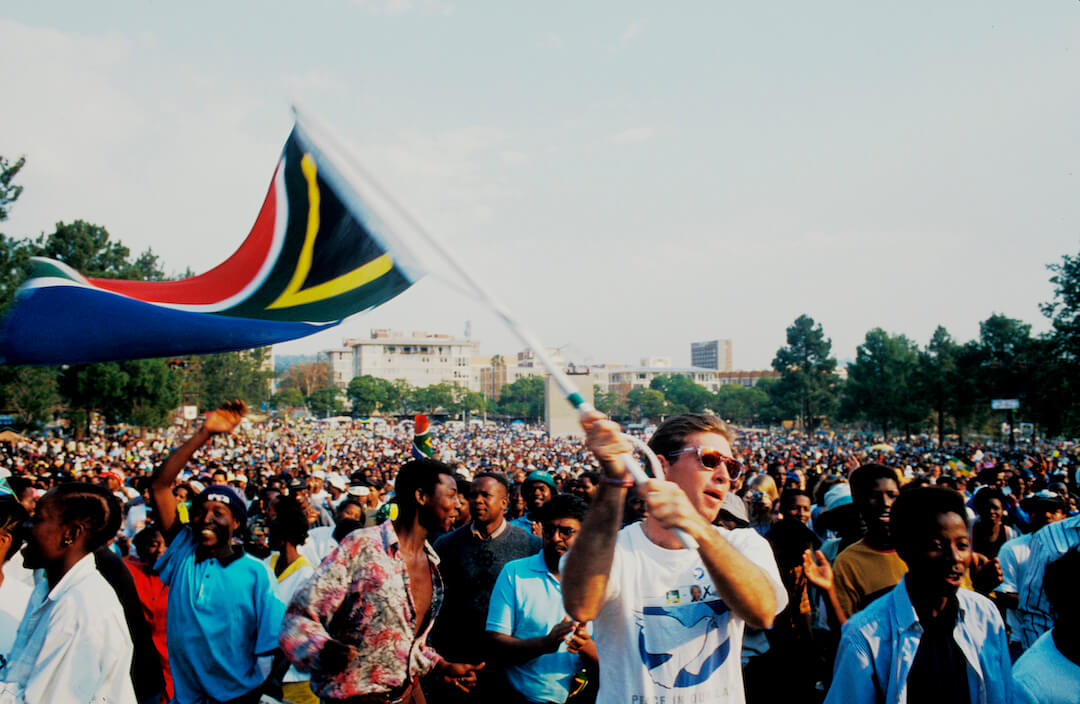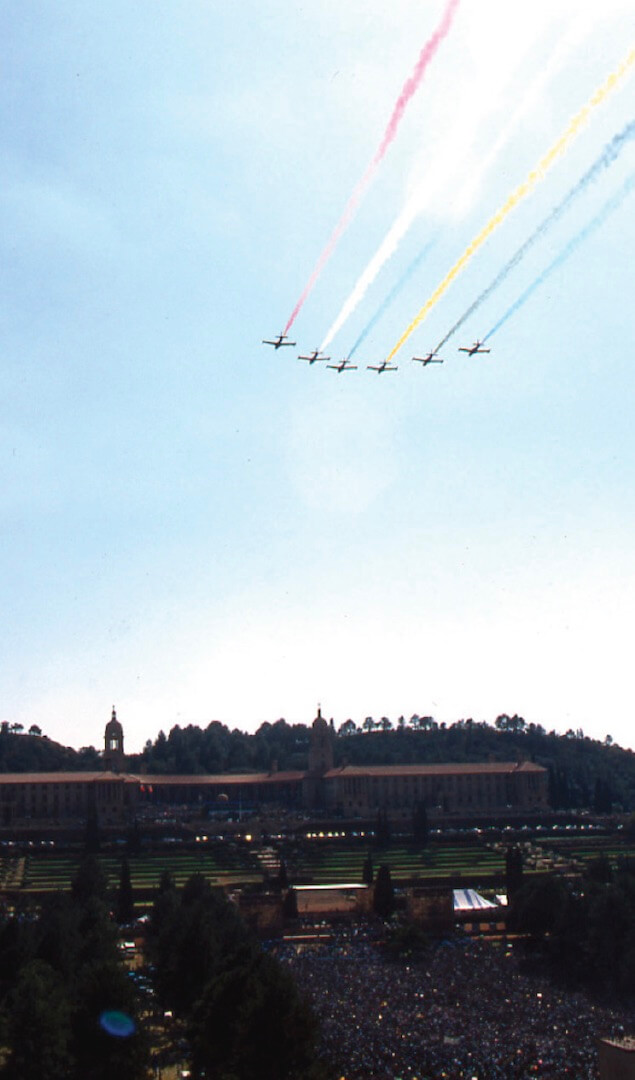The Story of the Inauguration
10 MAY 1994

Photographer unknown
Black President
Brenda Fassie
A National Inauguration
Committee (NIC):
This committee had been set up months before the election to oversee the political and protocol aspects of the day. It was made up of politicians from across the political spectrum as well as leading members of civil society and was chaired by then Chief Justice, Michael Corbett. Until then, presidential inaugurations in South Africa had been low key affairs with few international guests given the country’s pariah status. Now, the whole world was clamouring to be involved in the celebration. Jessie Duarte, long time anti-apartheid activist and then assistant to Mandela tells how he became involved in the guest list:
“Mandela had a view that every African leader who could possibly come should be invited. He said, ‘We need to be part of what Africa is going to look like and shape it and build it.’ If the President-Elect was told someone could not come … he’d pick up the phone – ‘Oh my brother … you know I would really like you to be here.’ And people couldn’t say ‘No’!”
The days before
the inauguration:
A steady flow of the who’s who from over 160 countries arrived in South Africa for the inauguration event. On 10 May 1990, 60 heads of state, royalty and 6 000 other dignitaries along with thousands of ordinary South Africans made their way to the Union Buildings – the imposing bastion of white domination atop Meintjieskop – and now the setting for this historic celebration.
Never again:
Just after noon, Mandela took his oath of office, declaring that the rainbow nation had at last achieved its “political emancipation”. He famously vowed that “never, never, and never again shall it be that this beautiful land will experience the oppression of one by another”. In a magnificent moment, the old regime saluted the new as six air force jets flew overhead, smoke trailing the colours of the new South Africa’s new flag. “They’re ours now”, was the sentiment running through the crowds.
Madiba magic:
After the festivities, the new President was flown by helicopter to Ellis Park Stadium where a soccer match was taking place between South Africa and Zambia. After a pep talk from Mandela at half-time, South Africa went on to score two goals, sealing the myth of the magic spell that Mandela spread across a euphoric nation.
The night of
the inauguration:
Mandela spent his first night as President at the State Guest House in Pretoria, which would be his temporary home for the next three months while De Klerk was moving out of Libertas, the presidential residence. Mandela later renamed his presidential residence, now his new home, Mahlamba Ndlopfu (“The New Dawn” in Xitsonga, meaning literally “the washing of the elephants” due to the fact that elephants bathe in the morning).
In their own words
“We worked 18-hour days before the inauguration. All Mandela’s calls, which came at all times of the night, were re-directed by the post office to my house so that he did not get disturbed. We had worked till the last minute to raise funds for elections and now the inauguration was another big hosting job.”
-Barbara Masekela, then Head of the ANC’s President’s Office and programme director for the inauguration ceremony
“De Klerk’s office briefed the inauguration committee about how people had to dress. I thought it was going to be fun to tell the President that he had to wear a pin-striped suit, pin-striped pants, and a black top and a hat … His response was absolutely immediate. He said, ‘I am not doing this. I don’t like to wear these things. Why can’t I dress the way I feel comfortable?”
–Jessie Duarte, long time anti-apartheid activist, then assistant to President Mandela
“The formal way in which inaugurations are planned is that you have to have the President and a first lady … Now in our instance it was difficult because we obviously didn’t have a Mrs Mandela. So we had to convince Madiba that his daughter had to sit in the place. He had no difficulty with that … He called Zindzi and Zenani and his son Makgatho … and they agreed that Zenani would sit next to him during the ceremony.”
-Jessie Duarte, long time anti-apartheid activist, then assistant to President Mandela
“I, Nelson Rolihlahla Mandela, do hereby swear to be faithful to the Republic of South Africa, and to solemnly and sincerely promise at all times…”
–Nelson Mandela, then President-Elect taking his oath of office during his inauguration
“The most important moment for me was the air show by the former members of the apartheid defence force. I had convinced myself that there would be drama and my imagination had gone wild. And to see everything go smoothly was just incredible and reassuring.”
-Barbara Masekela, then Head of the ANC’s President’s office and programme director for the inauguration ceremony
“Today South Africa regained its rightful place in Africa, in the UN, and the family of nations. South Africa has earned the respect and admiration of all; tireless in search of understanding, and vigorous in pursuit of peace. You have refused to let difficulties defeat you.”
–Boutros Boutros-Ghali, then UN Secretary-General at Mandela’s inauguration lunch at the Presidency
“At about 10:00 on 11 May, the day after the inauguration, Mandela arrived at the back entrance of the west wing of the Union Buildings, accompanied by a security detail of the as-yet unintegrated units of the South African Police and Umkhonto weSizwe [MK]. Two formidable women – Barbara Masekela and Jessie Duarte – who were at the heart of Mandela’s administration as ANC President, stepped along as smartly as they could, laden with paraphernalia for setting up office.”
-Extract from, Dare not Linger, the sequel to Nelson Mandela’s autobiography, Long Walk to Freedom
“Behind the rosy talk of the ‘New South Africa’, there were frightening realities to be faced: women’s unpaid and unrecognised contribution to the economy, the divide between the poor and the rich, the continuing hidden violence especially against women and girls … Women had to start from this reality, recognise their own power … and put women’s issues on the agenda in all political parties, in trade unions, in sport, media, the law and education.”
–Pregs Govender, then leader of the Women’s Coalition, reflecting on the work of the Women’s National Coalition
“The ANC was now in power. The National Party, with its Deputy President and members in cabinet had limited power; they nonetheless still had power in the Government of National Unity (GNU). The NP was increasingly becoming very lonely because they were bitter. They fought like cats and dogs among themselves and with the ANC.”
-Leon Wessels, then member of the Government of National Unity
“I asked Nelson Mandela what he wanted me to do and he said, ‘You will run Parliament the way we ran negotiations’. When I thought about it, he was saying, firstly, that Parliament must be inclusive because no one was excluded from negotiations and secondly, it meant that I had to get buy-in from the population for this new Parliament, like we did with negotiations.”
–Frene Ginwala, then newly appointed Speaker of Parliament





